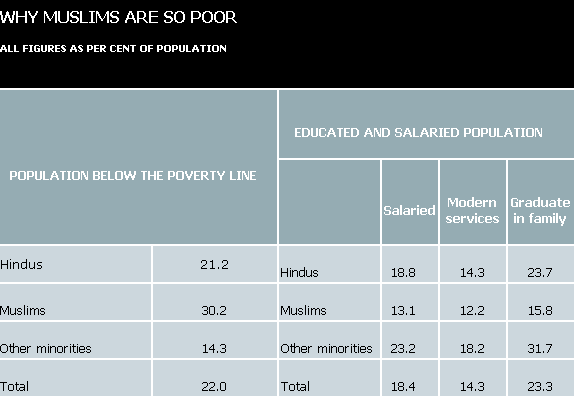And now, quotas for Muslims

After badly goofing up on the Telangana issue, it remains to be seen if the government will do the same with the Justice Ranganath Misra Report on linguistic and religious minorities — Prime Minister Manmohan Singh has assured Parliament that the report will be tabled in the ongoing session. According to newspaper stories, Justice Misra has recommended wide-ranging affirmative action, including quotas for Muslims and other minorities, in education, government jobs, pro-poor schemes like NREGA and even monitoring credit flows from banks to minorities. The report also proposes the list of SCs be extended to include Muslims and other minorities. Any statement of action on the report, it is obvious, will lead to agitations and violence as various interest groups will protest their turf being encroached upon; and the BJP will see this as the usual Congress pandering to Muslims.
The deprivation of Muslims, of course, was best captured by the Sachar Committee Report some years ago — presumably, the recommendations of the Misra report flow from the same sense of discrimination. So, quoting from NSS data, the Sachar report pointed out that over 30 per cent of Muslims were poor compared to 21 per cent for Hindus and 22 per cent for all Indians; the annual per capita expenditure for Muslims was Rs 7,637 versus Rs 8,568 for Hindus and Rs 8,645 for all Indians; the list goes on. All of this is obviously true, and no one can deny discrimination is legion, whether it is Hindu businessmen not employing Muslims or Hindu landlords not wanting to give their houses on rent to Muslims.
The problem with using such raw data is that, evocative as it is, it doesn’t explain how much of this is due to religious discrimination and how much due to other reasons — education, location, employment and things like that. This is what a book Rajesh Shukla of the NCAER and I have authored (it’ll be out in another few months) hopes to clarify. Based on NCAER’s annual survey of households across the country, it is the only source of information on household incomes — the NSS data focuses only on expenditure. While the book is basically aimed at debunking discrimination myths across caste groups (which is why tentative titles are “Not Caste in Stone†and “OBCs and other bogus conceptsâ€!), it has a section on religious differences as well.
Among all groups of people, the NCAER data shows, it is the salaried class that earns the most — in 2004-05, the average salaried household earned Rs 110,344 per year as compared to the country’s average of Rs 65,041. Similarly, the household which earned its income in the modern services sector earned Rs 112,222 and, in the case of households which had a graduate, the average income was Rs 117,844. Location also makes a difference and while the average village household had an annual income of Rs 51,922, this rose to Rs 80,217 in towns with less than half a million persons and to Rs 115,253 in big cities with more than a million persons.
Naturally then, it is the composition of population in these groups that will determine average incomes across religious groups. Muslims, as the table shows, have the smallest proportion of families in the salaried group (13.1 per cent versus 18.8 for Hindus), modern services (12.2 versus 14.3) and graduates (15.8 versus 23.7). In which case, the “discrimination†effect is really much smaller than appears at first glance — among graduates, for instance, Hindu households earn Rs 116,806 versus Rs 108,944 in the case of Muslims. Drill down further to the proportion living in villages and different sized towns, and the difference will reduce even further.
Whether the Ranganath Misra/Sachar kind of recommendations (some of them are similar) will help improve the lot of Muslims is open to question given how social transformation is a very difficult and time-consuming process, accepting them will be a boon for the BJP. Whether the Congress party wants to score another self goal after Telangana is the question.
Â
Welcome to Haindava Keralam! Register for Free or Login as a privileged HK member to enjoy auto-approval of your comments and to receive periodic updates.
Latest Articles from Bharath Focus
- Narendra Modi: The Architect of India’s Momentous Transformation
- Republic Day Tableaux & Regional Pride
- Tarun Vijay meets Governor Arif Khan on Adi Sankara birthplace
- SC-ST പോസ്റ്റ് മെട്രിക് സ്കോളർഷിപ്പിൽ 5 ഇരട്ടി വർദ്ധനവ്
- Treading the Middle-Path on Temple Management
- Taming the dragon-Part-3
- Taming the dragon- Part 2
- India- China trade wars on the cards? Well researched blog on Indian govt.’s proposed plan to tax 371 Chinese goods
- Before removing the idols, I should be removed; Two Kerala faces we should never forget
- The Unseen Unheard Victims of Article 35(A)


Responses